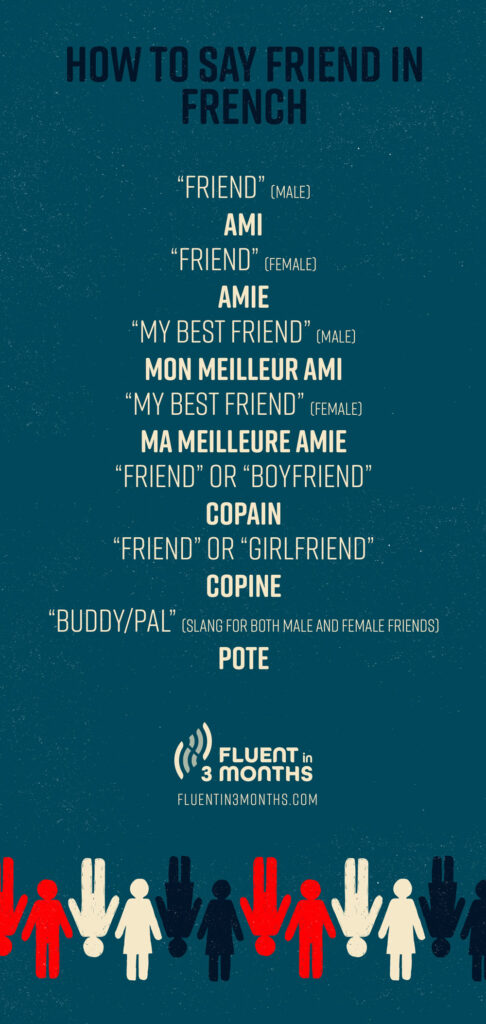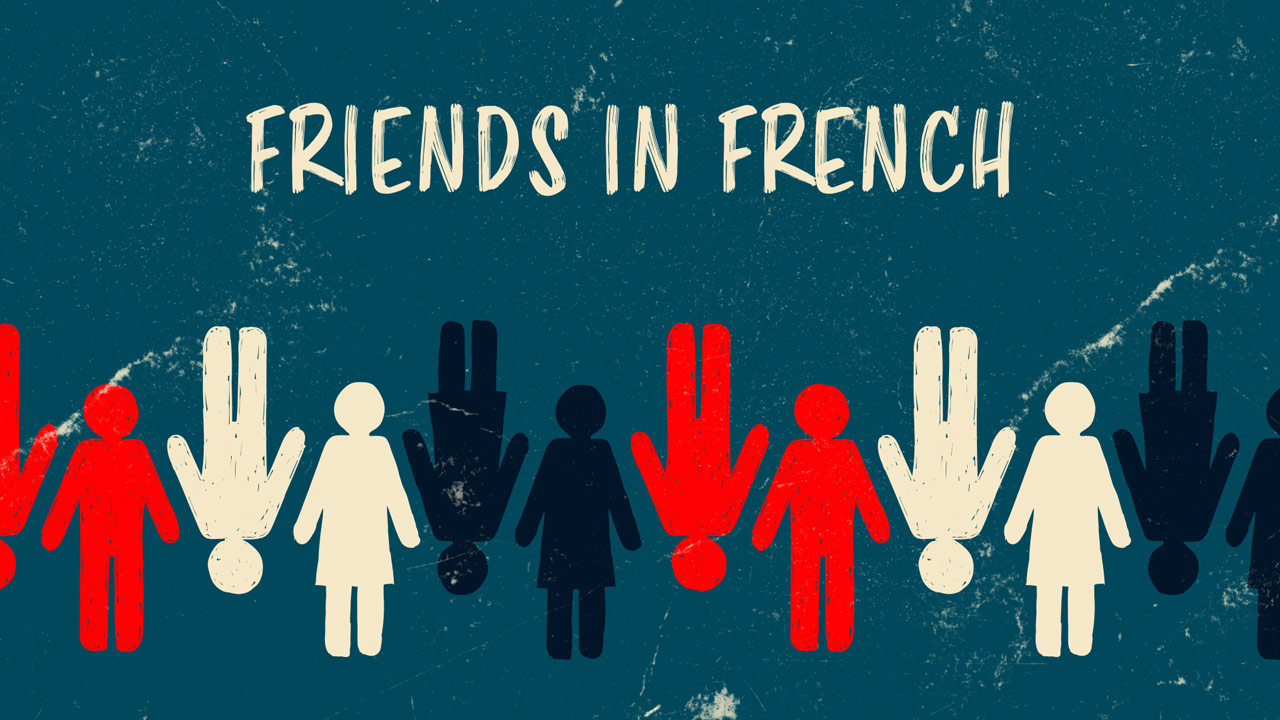How to Say Friend in French
The most common word for “friend” in French is ami. As with every other French noun, ami also has masculine and feminine forms — un ami is a male friend and une amie is a female friend.
Similar to how “buddy,” “pal,” or “mate” also mean friend in English, French also has other words for friend. For example, for your male friends, you can say copain, and for your female friends, you can use copine. These are more informal words, used with people you often hang out with. Depending on context, copain and copine may also mean boyfriend or girlfriend. If you want to increase the level of slang, use the word pote — it’s similar to “pal” or “mate” in English.
Having lived in France and Belgium, I’ve made many amis, copains, and potes while speaking French. Now I’m ready to help you do the same! Let’s start with a handy vocabulary list:
| English | French | Audio |
|---|---|---|
| “Friend” (male) | Ami | |
| “Friend” (female) | Amie | |
| “My best friend” (male) | Mon meilleur ami | |
| “My best friend” (female) | Ma meilleure amie | |
| “Friend” or “boyfriend” | Copain | |
| “Friend” or “girlfriend” | Copine | |
| “Buddy/pal” (slang for both male and female friends) | Pote |

Table of contents
- Ami and Amie: Friend in French
- Amis and Amies: Plural of Friend in French
- Copain and Copine: Friend and Boyfriend/Girlfriend in French
- Pote: The Slang Word for Friend in French
- Other Ways of Calling Your Friends in French
- Friendship Phrases in French
- Expressions and Useful Phrases with Friend in French
- Making Friends in France while Speaking French
- Practice Your French With Your New Amis
Ami and Amie: Friend in French
Ami is the most common word for friend in French. Its feminine form is amie. You can use it in all sorts of contexts, both formal and informal. Here are some examples:
- Mon ami Paul vient dîner ce soir. – “My friend Paul is coming over for dinner tonight.”
- Elle est plus qu’une amie, elle est comme une sœur pour moi. – “She’s more than a friend, she’s like a sister to me.”
Amis and Amies: Plural of Friend in French
To make ami and amie plural, you’d need to add an “-s” to the end. Amis is a group of male friends, or a group of male and female friends. Amies is a group of female friends.
- Je vais sortir avec mes amis, Patricia, Victor, et Karen ce soir. – “I’ll go out with my friends Patricia, Victor, and Karen tonight.” (Here, we used amis as the group has two women and a man.)
- Mes amis Victor et Paul aiment bien cuisiner. – “My friends Victor and Paul like cooking.” (Here, we used amis as we’re talking about two men.)
- Elle a invité toutes ses amies à sa fête d’anniversaire. – “She invited all her (girl)friends to her birthday.” (Here, we used amies as the group has only women.)
Copain and Copine: Friend and Boyfriend/Girlfriend in French
Copain and copine also mean friend. They’re more informal than ami and amies — you can use them to describe the friends you usually hang out with.
Depending on context, copain means “boyfriend” and copine “girlfriend.” Let’s take a look at these example sentences — pay attention to the English translations to see where copain and copine mean “boyfriend” and “girlfriend.”
- Mon copain s’appelle Antoine. – “My boyfriend’s name is Antoine.”
- Il vit avec sa copine. – “He lives with his girlfriend.”
- C’est qui ? C’est un copain de Tom ? – “Who is that? Is it one of Tom’s friends?”
- Mes copines viennent me voir demain. – “My friends are coming to see me tomorrow.”
Pote: The Slang Word for Friend in French
Pote is a popular slang term to say “friend” in French, used in informal and casual contexts, especially among younger people. Think of it as “pal,” “mate,” or “buddy” in English.
- Salut, mon pote! Ça va ? – “Hey buddy! How are you?”
- C’est qui ton meilleur pote ? – “Who’s your best friend?”
- Nous faisons une sortie avec les potes ce weekend. – “We’re going out with friends tonight.”
Other Ways of Calling Your Friends in French
You can call your super close friends frère (“brother”) and sœur (“sister”), or get creative with endearment terms. For example, two French guys may call each other beau gosse which means “handsome” but translates to “beautiful kid.” Saying mec (“dude”) or meuf (“girl”) are also popular ways of referring to your friends.
| English | French | Audio |
|---|---|---|
| “Brother” | Frère | |
| “Sister” | Sœur | |
| “Dude” (literal translation: guy) | Mec | |
| “Girl” | Meuf | |
| “Sweetie” (for men) | Loulou | |
| “Sweetie” (for women) | Louloutte | |
| “Handsome” (literal translation: beautiful boy) | Beau gosse | |
| “My beauty” | Ma belle |
Friendship Phrases in French
“How long have you known each other?”
“Let me introduce you to my friend.”
“Want to hang out with my friends tonight?”
These phrases often come up when you meet someone. Here is a useful list you can refer to when talking about your friends, introducing others, and meeting new people.
| English | French | Audio |
|---|---|---|
| “We've been friends since…” | On est amis depuis… | |
| “We've known each other since…” | On se connaît depuis… | |
| “We get along well.” | On s’entend bien. | |
| “Let me introduce you to my friend…” | Je te présente mon ami(e)… | |
| “We should hang out more often.” | Il faut qu’on se voit plus souvent. | |
| “Want to do something tonight?” | Tu veux faire quelque chose ce soir? | |
| “I’ll go out with my friends tomorrow” | Je vais sortir avec mes amis demain. | |
| “I'll always be there for you.” | Je serai toujours là pour toi. | |
| “You’re my best friend” | Tu es mon meilleur(e) ami(e). |
Expressions and Useful Phrases with Friend in French
Let’s move on to describe some of the activities you’d typically do with your friends:
| English | French | Audio |
|---|---|---|
| “To make friends” | Se faire des amis | |
| “To go out with friends” | Sortir avec des amis | |
| “To have a drink with friends” | Prendre un verre avec des amis | |
| “To chat with friends” | Discuter avec des amis | |
| “To get along well with someone” | S'entendre bien avec quelqu'un | |
| “To build a strong friendship” | Construire une amitié solide | |
| “To spend time with friends” | Passer du temps avec des amis | |
| “To stay in touch with friends” | Rester en contact avec des amis | |
| “To be best friends” | Être meilleurs amis | |
| “To be friends for life” | Être amis à la vie |
Making Friends in France while Speaking French
Enrolling in a French language course, moving to France, or simply traveling in the Hexagon? Now that you know the words for “friend” in French, it’s time to learn about etiquette.
Use the “Formal You,” then Switch to the “Informal You”
French has two pronouns for “you:” tu (“informal you”) and vous (“formal you”). You usually start addressing someone with vous when you first meet, especially in a professional or unfamiliar setting. As you get to know the person better, you can switch to the informal tu.
Of course, this depends on context. When you’re not sure, it’s better to start with vous and wait for the person to ask on peut se tutoyer? (“can we call each other tu?)
Familiarize Yourself with the French Culture
Learn about French culture to act more naturally around your French friends. For example, in France, it’s normal to do la bise, kissing each other on the cheek when you greet someone.
Make Every Effort to Speak French
Your French friends will appreciate your efforts in speaking the language. They’ll also be happy to teach you new words, such as local slang or unique idioms. Don’t be afraid to make mistakes; they’re a natural part of the learning process and can even be a source of humor and bonding.
Attend Language Exchange Events or Join Clubs
Attend language exchanges or cultural events to connect with people who share your interests. A sports team, a book club, or a cooking class all mean tons of potential new friends, as well as new vocabulary!
Practice Your French With Your New Amis
While words like ami and copain are essential, friendship goes beyond vocabulary — and your new French-speaking friends will appreciate you speaking the language and getting to know the culture. Continue practicing French with different resources to improve your vocabulary and find new topics with your amis, copains, and potes!



Social